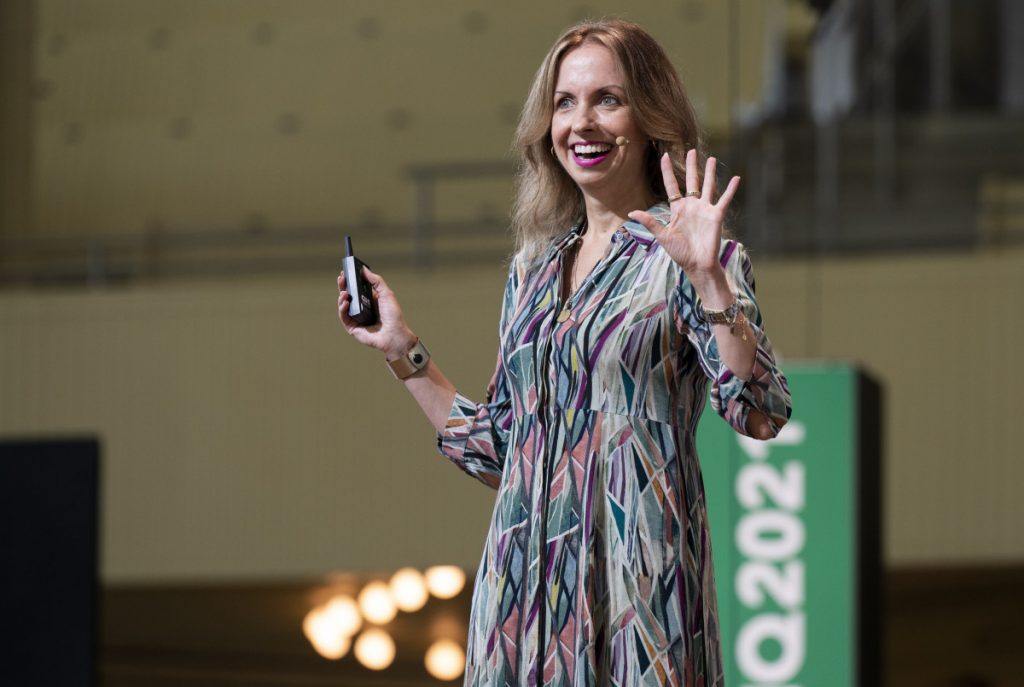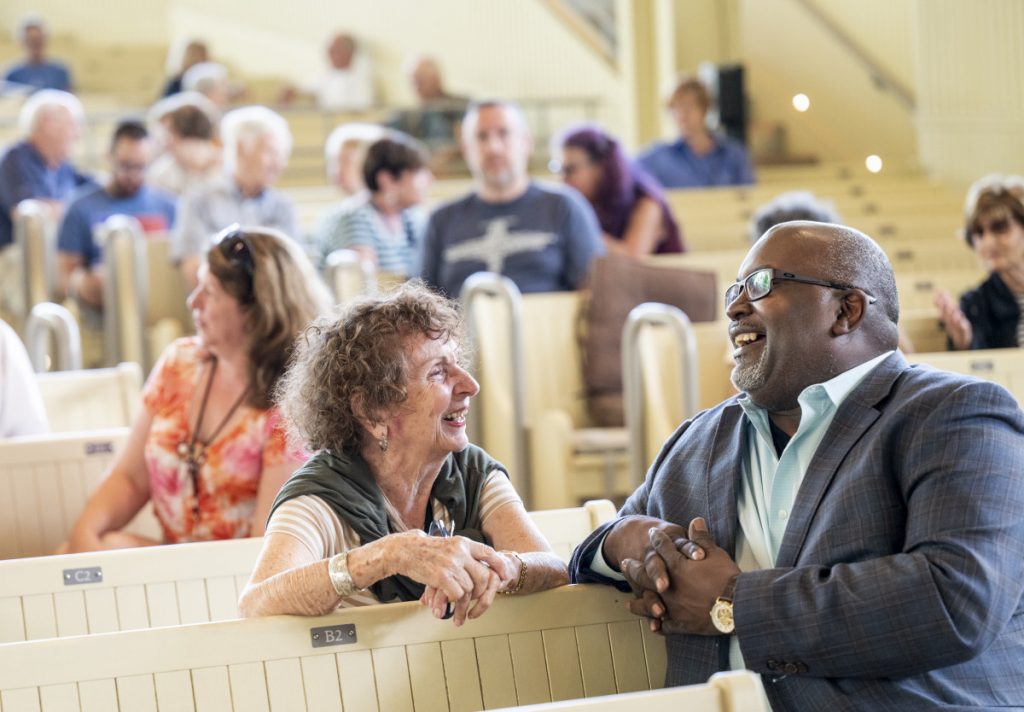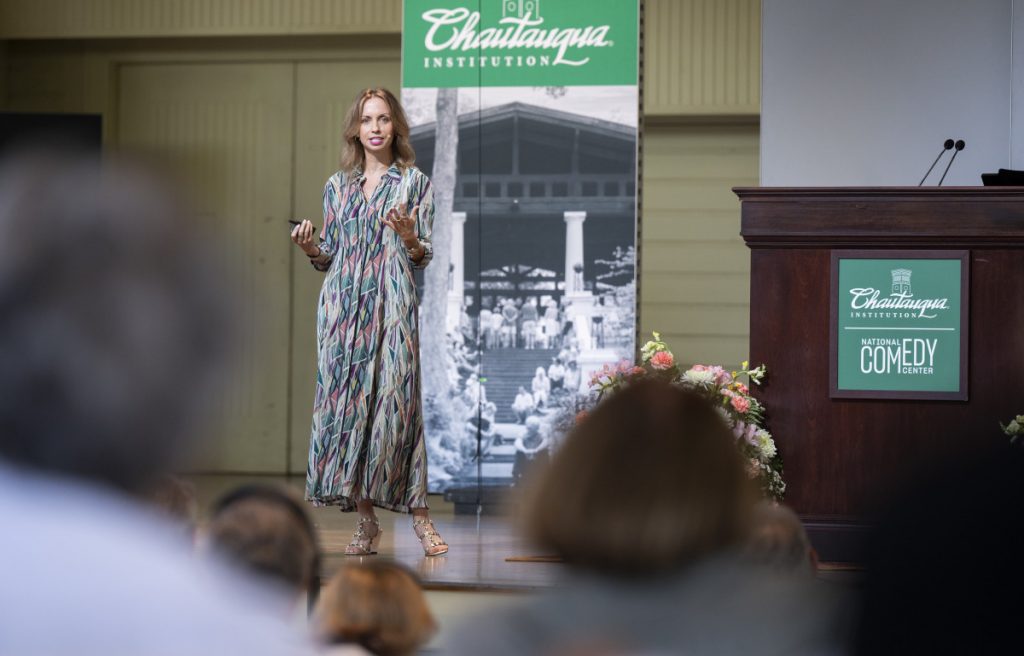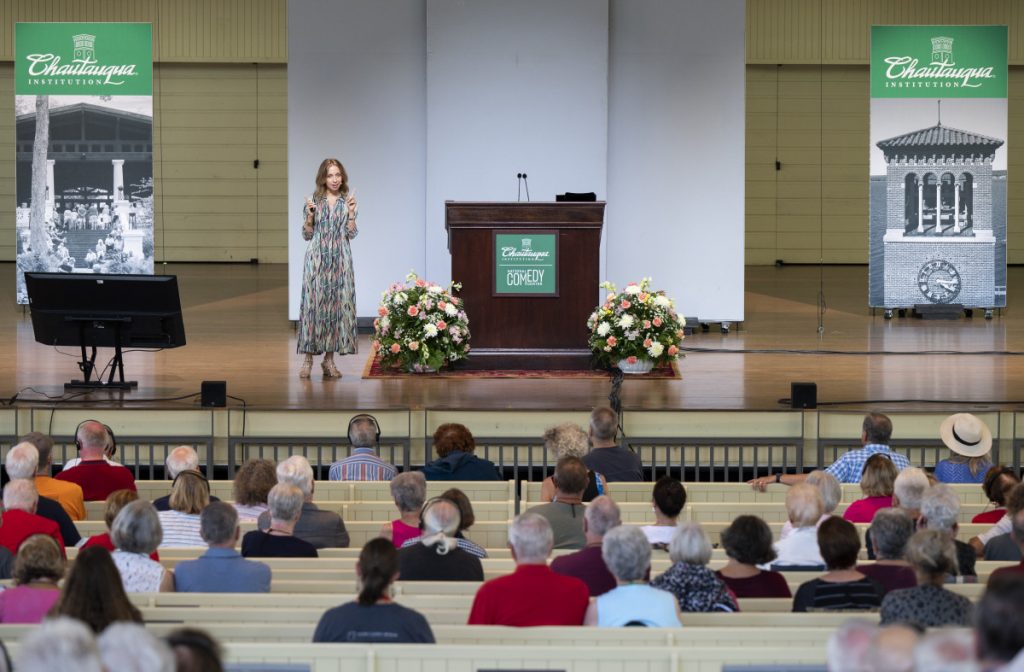NICK DANLAG – STAFF WRITER

Caty Borum Chattoo started her lecture by asking the audience to play a game. They would turn to the person next to them and say what their perfect birthday party was. The other person would respond by saying: “No, but.”
Then they would turn to another person, tell them what their perfect New Years’ party would be, and the other person would say “Yes, and,” expanding on their ideas.
As ideas and energy in the air changed the atmosphere in the Amphitheater, people seemed more relaxed and focused. Borum Chattoo, an award-winning media producer and executive, said this exercise is all about play and silliness.
She then quoted play scholar Miguel Sicart: “Play is disruptive. It disrupts the normal state of affairs. Play is escape and engagement. Through play we experience the world. We construct it and destroy it. And we explore who we are and what we can say.”
Though Borum Chattoo isn’t a comedian, she was a “bad” kid growing up, even failing algebra because she would not stop telling jokes in class. Early in her career, she worked with Norman Lear, the iconic television producer, who turned 99 the day before the lecture. Lear was one of the first people to talk about social issues through comedy on television.
“For me personally, he was the first grown-up person I had met who was successful and was also really silly,” Borum Chattoo said. “For me, this is the best because I was able to be myself. I didn’t have to choose between being serious and kind of brainy and nerdy, and silly.”
She knew she was curious and wanted social change, but she noticed social movements, philanthropists and non-governmental organizations did not take comedy seriously, which meant they didn’t believe in the power of the art form. Borum Chattoo and others noticed that traditionally marginalized groups, such as people of color, LGBTQ+ and disabled communities, needed more shows about their own experiences. So they took action.
Borum Chattoo is in partnership with cultural strategy group Moore + Associates, co-founder and co-director of the Yes, And … Laughter Lab, a group that establishes partnerships across the entertainment industry and uses comedy to promote social justice.
At 10:30 a.m. on Wednesday, July 28 in the Amp, Borum Chattoo presented her lecture, titled “Taking Comedy Seriously for Social Good & Justice,” as part of Week Five’s theme of “The Authentic Comedic Voice: A Week in Partnership with the National Comedy Center.” She discussed the science and social research around comedy, and how the art form is used to create social movements and change.
Social justice, she said, is about righting wrongs within institutions, and requires people to see the world differently and believe that there can be a better one. Borum Chattoo said comedy is symbiotic with justice.
“The reason that we laugh is because a comedian takes a reality that we recognize and bends that reality just enough so that we laugh,” Borum Chattoo said.
Comedians have unique artistic processes, and this creativity is often missing within boardrooms and businesses.
“It’s so radically open and becomes deviant and naughty before it becomes something that we experience,” Borum Chattoo said. “We need that to happen.”

She said creativity is the most important ingredient for innovation.
“We have never innovated as a culture without creativity,” Borum Chattoo said. “I know sometimes we don’t give this kind of thought enough space because it sounds soft to us. We’d like to think that we only progressed through rational information.”
Borum Chattoo has read and synthesized more than 300 studies of comedy, from fields of social science, geography and biology, and delved into many of the different powers that the art has, both on individuals and cultures.
She talked first about the power to give individuals easy entry into taboo subjects, such as conversations about HIV in South Africa. The country has high rates of the virus, and it is frowned upon to talk about HIV.
“Sometimes humor is the only way to broach that kind of topic,” Borum Chattoo said.
It also gives hope and acts as a gateway to more traditional forms of information over time.
“That’s pretty amazing, right?” Borum Chattoo said. “Sometimes I get people say, ‘Are you saying we should do all comedy and not journalism?’ No, I’m just saying: Also pay attention to comedy.”
Another comedic power, Borum Chattoo said, is its memorability. She said people like “Flo from Progressive” commercials not because of the company, but because she is funny. This is why humor is the most important marketing strategy.
She also said comedy persuades.
“When we watch comedy, we experience hope and optimism because we’re busy being entertained,” Borum Chattoo said. “Those emotions in turn are correlated with our attitudes, and even our actions, over time. Comedy can be powerful.”
And comedy has much broader cultural powers, like social critique and civic engagement. When Jon Stewart hosted “The Daily Show,” he did the first of these very well, essentially teaching a generation of young Americans media literacy and how to question what they hear on the news. Currently, Stewart’s successor, Trevor Noah, is taking steps to make the show his own while also critiquing society, and so are a plethora of other late-night shows.
“I would argue that there’s a special role that comedy gets to play in that because comedy invites us to play, and often correct dehumanizing images of people in communities,” Borum Chattoo said.
Borum Chattoo shared two examples: “Ramy” and “Rutherford Falls.”
The first is about the title character who, according to IMDB, “begins a spiritual journey, divided between his Muslim community, God, and his friends who see endless possibilities.”
“Unfortunately, this is somewhat of a corrective because we know from decades of research that a way that our entertainment media and our news has dehumanized Muslim communities quite dramatically so that we need a lot of those stories. ”
The second is about a small, Northeast town in an ongoing debate about moving a historical statue. She then paraphrased Jana Schmieding, one of the show’s actors and writers, who said they were tasked to not show the long-suffering Native American trope that American media has shown forever, but instead, “We’re showing how funny we are.”

Another power on cultures is allowing audiences to imagine a different world.
“It’s not enough for social change to talk about what is wrong,” Borum Chattoo said. “We have to show what the world looks like and imagine it when it’s better.”
In “Schitt’s Creek,” the show’s creators purposely didn’t include any in-world prejudice against gay characters. Part of the reason was one of the show’s creators, Daniel Levy, who said he didn’t have any patience for homophobia. Though Borum Chattoo said this may seem too utopian, the creators received a lot of letters from fans thanking them for showing a world without homophobia they never imagined.
Then Borum Chattoo discussed what she and others are doing with this information, and creating a “Think and Do Tank.”
“I like to create things,” Borum Chattoo said. “We never want to do research and just have it sit somewhere because that sounds very boring.”
Sometimes when companies hire comedians to help with events or social movements, the performers are treated as jesters, performing 10 minutes of stand-up at the beginning of the event and then given no other responsibilities.
This is where the Yes, And … Laughter Lab enters. Comedians apply, pitch and, if they are chosen from a pool of around 400 applicants, produce their own comedy shows that shed light on important, underrepresented issues.
The winners this year include Meredith Casey, Ayman Samman, Abdallah Nabil, S.J. Son and Woody Fu.
She ended with a quote from Bernard De Koven, an American game designer and fun theorist: “Imagination offers us the ability to connect compassionately. It helps us understand and relate to one another’s lives and loves regardless of social strata, ethnic inheritances, physical or mental ability. It is a gift that restores us to the best of our humanity.”
As part of the Q-and-A, Deborah Sunya Moore, senior vice president and chief program officer (interim) and vice president of performing and visual arts, asked Borum Chattoo what important shows are currently airing.
Borum Chattoo said “Modern Family” was important for many reasons, then asked the crowd if it was still ongoing. Some people in the crowd said no.
“Thank you, Eric Deggans,” Borum Chattoo said to Deggans, NPR TV critic and the lecturer of the previous day, who was sitting in the second row. They then pointed to each other.
Borum Chattoo said “Black-ish” has been quite influential because it has a predominantly white audience.
“Chances are, if we live in a Black family in America, you have talked about these issues, you have to talk about racism,” Borum Chattoo said. “But for a predominantly white audience to hear a Black family talking about police brutality, I think that is profound.”
She said shows that can reach an array of audiences can create change.
“I think about, not a magic bullet theory of comedy. You don’t watch something and immediately think, ‘Well now all of my views are changed,’ ” Borum Chattoo said. “But over time that cultural landscape and sort of montage of messages that we receive is meaningful.”





